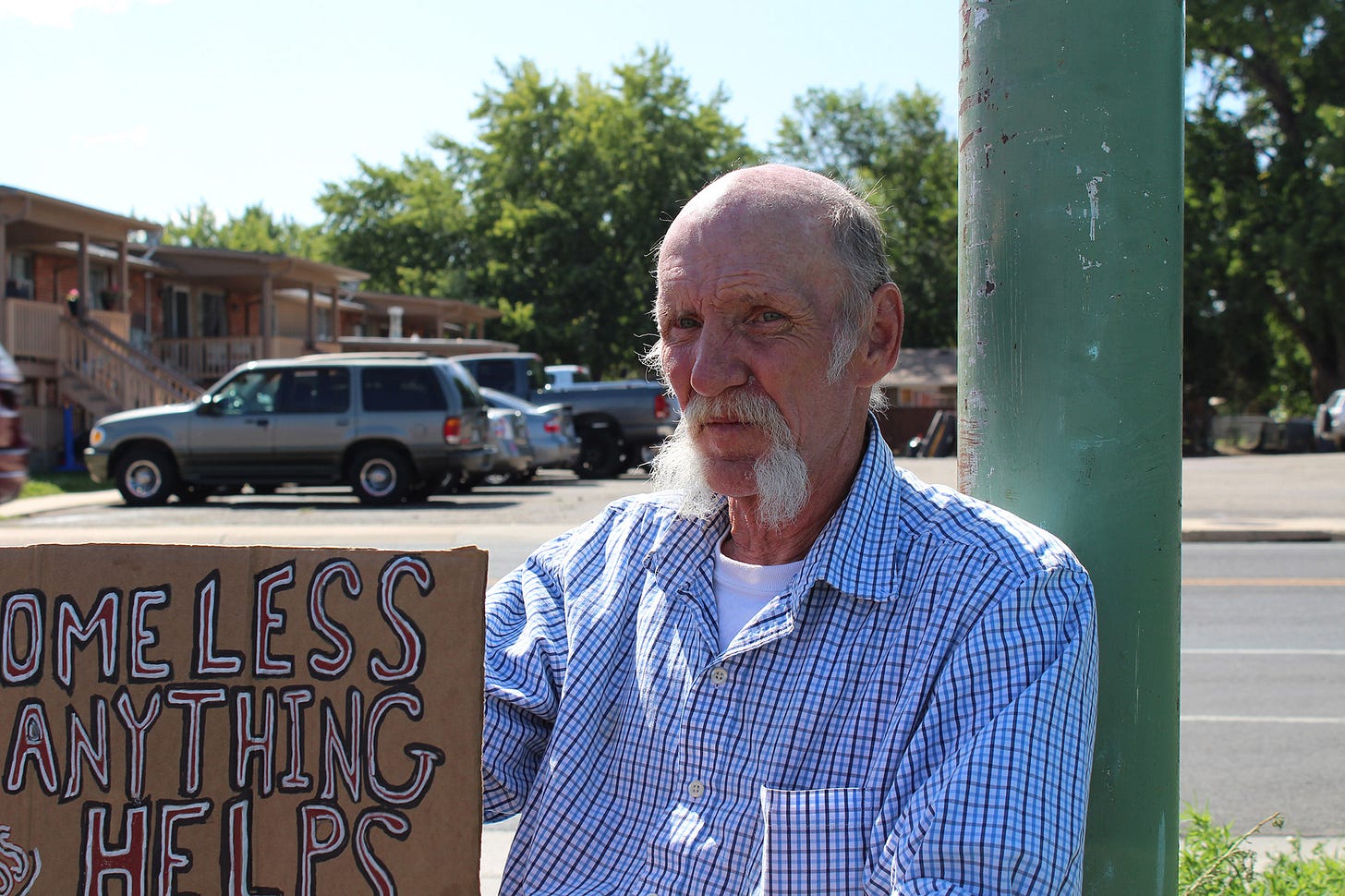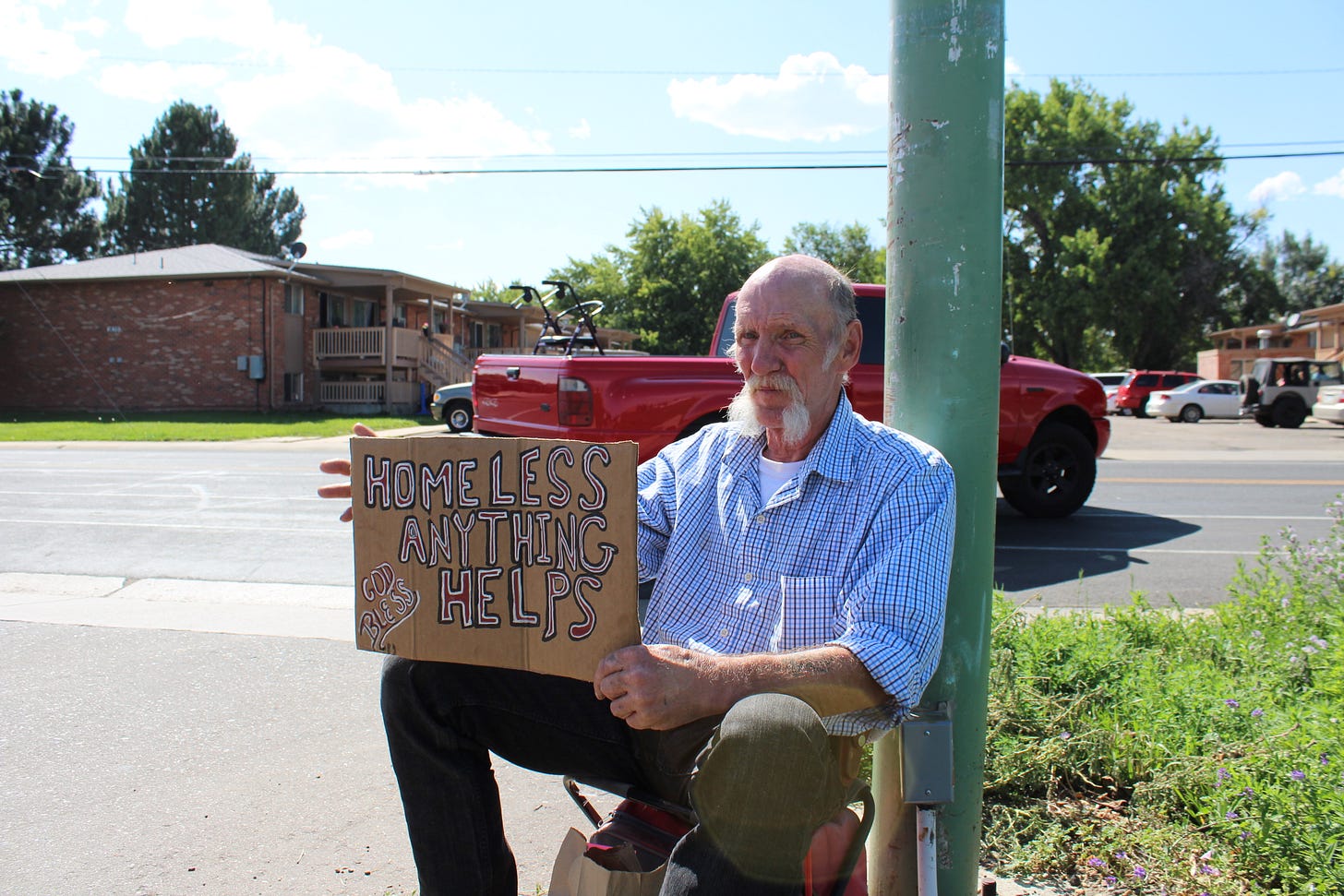Pops Williams, Who Lives on the Streets in Colorado
Whenever I see someone sitting on a curb, “flying a sign” like this, I think about Russ and wonder how he’s doing.
This is a story I wrote for a journalism class in college back in 2018. With the huge number of homeless people I see on a daily basis in Tucson, where I live now, I’ve been thinking about Russ and wondering how he’s doing.
LONGMONT, COLORADO – When Russ Williams’ family moved from Montana to Colorado in 1958, his first few days here were a shocking surprise. He woke up one morning, completely abandoned as a child.
“My parents left me in a motel room when I was five years old. I’ve been here ever since.”
Learning that his parents had disappeared, he was forced to provide for himself, his two little sisters, and younger brother.
“I was stealing out of Safeway trash cans to feed the kids. We stayed [at the motel] for about two weeks before the county ever come and got us.”
Once the authorities arrived, the children were split up and sent to different locations. Williams was sent to a facility in Golden in what was then called Lookout Mountain School for Boys. “It was a lot like a juvenile prison,” he remembers.
That was almost 6 decades ago. Since that time, he married, raised three children, and now has at least two grandchildren he knows about. 6 years ago, after 32 years of marriage, his wife died.
Now, in his 60s, he sits by an intersection, holding his sign, and waving to passersby. He estimates that 1 in thirty drivers stop to offer a helping hand. Almost all of them wave back to him.
He comes to the same spot almost every day, staying for 3 to 4 hours and leaving when he has enough cash to get through the night.
“Usually, I’ll get $15-$20 a day, and that’s enough to give me my cigarettes and get me a meal. I do drink, and I do smoke cigarettes, you know. I got my vices.”
He’s aware of the large number of street people in Longmont and doesn’t want to take more than he needs.
“Somebody else is going to need that money, too, so I’m not going to take it all.”
Williams tries to set an example and takes care of the other homeless people around town, which is how he earned his nickname in the first place.
“I know most of the street people. We all got our nicknames. They call me ‘Pops’ because I adopt so many of them, and I take care of them. I’m probably one of the oldest out on the street right now.”
While he has worked most of his adult life, Williams has relied on the generosity of others for the past 9 years after needing urgent back surgery.
“I was a maintenance man at a motel. I woke up one morning and couldn’t move my legs. I called the front desk and told them to get an ambulance, and two days later, I was in Sioux City, Iowa, getting my neck operated on. The day after that, they did my lower back since my spine was snapped in two different spots.”
His back is fused in two places, and as a result, he is unable to stand for long periods of time. He has worked occasionally since the surgery, mostly as a day laborer, but once his employers find out about his back injury, they won’t let him work anymore because they can’t insure him.
He spends his days sitting on a cooler, accepting handouts from drivers who take the time to slow down and engage with him. He’s quick to point out that what he’s doing is not illegal, and it’s not panhandling.
“This is flying a sign. Panhandling is walking up to a vehicle or a person and saying, ‘Can I have some money?’ That’s panhandling. This is just flying a sign. This is perfectly legal. Same as a guy out on the corner holding a pizza sign. They can’t do nothing about this.”
At night, Williams sleeps by the river, under a bridge, or in a grove of trees. When the weather turns bad, he’ll take extreme action to stay warm.
“One year, I slept in a dumpster because it was freezing outside, and I covered up with trash.”
Life in the street is not always unpleasant, and there are alternatives to sleeping in a trash can when it snows. Sometimes, he will seek shelter in a Walmart, staying awake all night.
“I’ll go to Walmart. I’ll sit [on the floor] and read books. I like to read.”
His favorite author is the Western novelist Louis L’Amour. He is confident he has read every one of L’Amour’s books that are in print, which is over one hundred. In particular, his favorites are the stories of The Sackett family.
Williams’ own story, he insists, is not that interesting. Sometimes people who stop will roll down their windows and ask about his life.
“It ain’t much of a story. It’s just… I had everything at one time, and then I lost it.”




